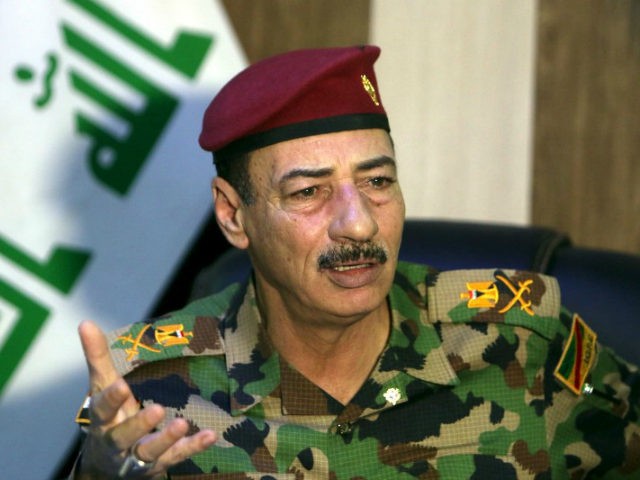The Islamic State (ISIS/ISIL) in Iraq is weaker now than it was three months ago, the Iraqi commander of the planned offensive to retake Mosul told Breitbart News, echoing U.S. government and military officials.
“Daesh is not the same as they were three months ago,” Major General Najm Abdullah al-Jubbouri, chief of offensive dubbed the Nineveh operation said, using an Arabic name for ISIS. “Daesh is weaker thanks to U.S. airstrikes on its infrastructure, which has depleted their finances and taken out many of their leaders. They’re more limited.”
Mosul is the provincial capital of Nineveh in northern Iraq and the country’s second largest city.
As ISIS loses territory, a spate of attacks in and around Baghdad over the past week has left more than 200 people dead.
The wave of attacks, many claimed by ISIS, “shows that morale within the group is down and they will launch any operation in a desperate attempt to show they can still attack,” declared Gen. Jubbouri.
U.S. government and military officials have recently echoed the Iraqi commander’s assessment that ISIS is weaker.
“ISIS (is) returning to suicide bombings … it relies on suicide attacks for very spectacular headlines and it’s not hard to have a person strap on a suicide vest and walk into a market and blow himself up,” Brett McGurk, U.S. President Barack Obama’s special envoy to the anti-ISIS coalition told reporters in the Jordanian capital of Amman on Sunday.
“Now this perverse caliphate is shrinking so they are very much on the defensive,” he added. “Their territory is shrinking, and they are now doing these barbaric suicide attacks against the civilian populations.”
According to the U.S.-led coalition, ISIS lost 40 percent of its territory in Iraq last year and about 20 percent in Syria.
In March, the Pentagon estimated that the anti-ISIS alliance had killed more than 10,000 ISIS fighters and 20 leaders.
The Associated Press (AP) and BBC have quoted officials from the Iraqi government and the U.S.-led coalition against ISIS as saying the recent bombings in and around Baghdad are a sign of the Islamic State’s desperation.
ISIS is “increasingly turning to insurgency-style attacks to detract from their losses,” striking at civilians because they are “losing ground on the battlefield,” the officials said.
In late April, Air Force Maj. Gen. Peter Gersten, the deputy commander for operations and intelligence for the U.S.-led campaign against the ISIS, told Pentagon reporters that the number foreign fighters traveling to join ISIS in Iraq and Syria has dropped by 90 percent, from nearly 2,000 per month to 200 within the past.
Like Iraqi Gen. Jubbouri, the U.S. military official attributed ISIS’s weakness to airstrikes that have targeted ISIS’s infrastructure.
Earlier this month, FBI Director James Comey told reporters that the flow of Americans traveling overseas or attempting to go there to engage in terrorism on behalf of ISIS dropped dramatically in 2014 and the first half of 2015, from “six, eight, 10” per month to an average of one.
However, he added that there are “north of 1,000” cases in which FBI agents are in the process of evaluating a suspected terrorist’s level of radicalization and potential for violence. An estimated 80 percent of those cases are linked to ISIS.
CNN learned from political risk analyst Kirk Sowell last week that the loss of territory has led ISIS to change its tactics.
“ISIS has receded somewhat militarily; they don’t have a … standing army to hold territory,” said Sowell. “But what they’re good at, unfortunately, is these terrorist attacks against soft targets.”
“Experts have blamed the violence in part on a security vacuum they say has opened once again in Iraq as the country faces renewed political turmoil,” notes CNN. “Prime Minister Haider al-Abadi is struggling to firm up a government capable of battling ISIS and, at the same time, address the country’s long-standing economic and political wounds from years of war.”
ISIS has capitalize on the vacuum to launch the spate of deadly attacks in Iraq, CNN quotes experts as saying.
Iraq has been able to reclaim Tikrit and Ramadi, two major cities, from ISIS. Iraqi security forces have been planning a major offensive to retake Mosul, the largest city in the hands of ISIS.
The terrorist group still controls large swathes of Iraq and Syria, home to its so-called “caliphate.”
While ISIS has reportedly weakened in those two Middle East countries, the group has flourished in Libya.
Gen. David Rodriguez, head of U.S. Africa Command (AFRICOM), told Pentagon reporters in early April that ISIS’s presence in Libya had more than doubled to between 4,000 and 6,000 in the last 12 to 18 months.
He noted that the group’s stronghold in the country is located in the port city of Sirte, which is only a few hundred miles across the Mediterranean Sea from the shores of Europe.

COMMENTS
Please let us know if you're having issues with commenting.